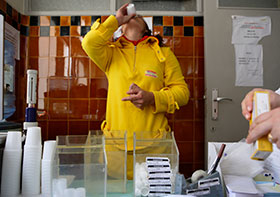HIV/AIDS epidemic in Europe: HIV transmission through injecting drug use

WHO/Marcus Garcia
- a client on opioid substitution therapy in Portugal
Opioid substitution therapy is one of the best ways to prevent HIV transmission among people who inject drugs. Integrating such therapy with HIV treatment and care is key to addressing the HIV epidemic effectively.
In the WHO European Region, the rate of HIV transmission through injecting drug use has remained relatively high and stable between 2010 and 2012. While decreasing in the east, it increased in the centre and west of Europe. The increase was due mainly to outbreaks in two European Union countries.
In September, WHO/Europe will report on progress in implementing the European Action Plan for HIV/AIDS 2012–2015. Each month until then, we highlight a specific area of the Action Plan – this month, reducing HIV transmission from injecting drug use.
Progress in reducing HIV transmission from injecting drug use
In 2011, over 713 000 people were receiving opioid substitution therapy in 45 European countries, including 11 300 in the east. Coverage with the therapy was below 5% of people in need in most countries in the east of the Region.
Between 2010 and 2012, 6 countries achieved, and a further 11 are now on track to reach, the 2015 European target of a 50% reduction in new HIV infections acquired through injecting drug use; 14 countries reported no substantial reduction in recent years.
WHO’s support to European countries
WHO/Europe supported countries in preventing new infections among people who inject drugs and improving the accessibility and quality of harm reduction services, in collaboration with partners by:
- identifying behavioural factors, structural barriers and environmental risks that hinder access to harm reduction, treatment and care for intravenous drug users;
- providing guidance on the effective use of opioid substitution therapy;
- convening a consultation on the prevention of HIV in injecting drug users in central Asia;
- sharing best practices and challenges for HIV prevention in injecting drug users in communities and prisons; and
- designating a new WHO Collaborating Centre for Harm Reduction in Lithuania.
Progress report for 2014 Regional Committee
The 2011 WHO Regional Committee for Europe adopted the European Action Plan for HIV/AIDS 2012–2015 and requested the Regional Director to report on implementation to its 2014 session. The report to the Regional Committee will describe the progress made since 2011 and the remaining challenges.



